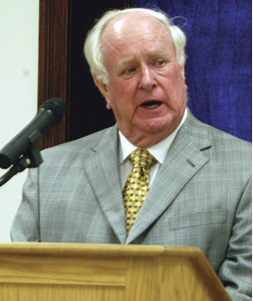Boston pharmacist sentenced to nine years in case of tainted steriods

The man who was convicted of several charges in the case involving tainted steroids that resulted in the death of long-time Clinton County Circuit Judge Eddie C. Lovelace, has been sentenced to nine years in prison.
Barry Cadden, the head pharmacist that produced the tainted steroids that caused the death of Lovelace as well as more than 60 other patients, was sentenced this week in U.S. District Court in Boston.
Cadden was found guilty in March of this year in a trial that had begun in January.
Although he was charged with 25 acts of second degree murder, the jury found him guilty on 57 counts of the 96 charges against him, none of which were guilty verdicts that included the murder charges.
Cadden was found guilty on charges of conspiracy, fraud and racketeering by the nine woman, three man jury that reportedly deliberated 20 hours after hearing over 60 witnesses testify.
The trial that began in January lasted over nine weeks.
Cadden was the co-founder of the New England Compounding Center (NECC) where the tainted steroids were produced.
During the trial, it was determined that Cadden and the NECC pharmacy, produced hundreds of doses of steroids that were found to be tainted due to non-sterile conditions.
Those non-sterile conditions in the compounding pharmacy had resulted in the steroids being tainted and causing the patients to contract the strain of meningitis that caused serious health problems and often, as in the case of Lovelace, resulted in death.
Lovelace, who had been injured in an earlier automobile accident that had caused problems with his back, received the steroid injections at Saint Thomas Outpatient Neurosurgery Center in Nashville on July 27, August 17 and August 31, 2012.
The long-time Clinton County Circuit Court Judge contracted a deadly strain of meningitis following those injections of the tainted steroids, and died in September 2012.
At that time, it was believed that he had suffered a stroke and died from complications related to that.
When reports of the tainted steroids began surfacing later, the Lovelace family requested that his body be exhumed and that an autopsy be performed to determine the exact cause of death.
Dr. George R. Nichols, II, then the state medical examiner for Kentucky, performed that autopsy and from his examination determined that Lovelace had, in fact, died as a direct result of having received injections of the tainted steroids.
Nichols said that the injections given to Lovelace at the Nashville, Tennessee clinic contained a fungus that had set off a series of health problems that had led to his death.
“The organism was introduced by an injection of a tainted pharmaceutical substance. That’s how it all happened,” Nichols stated after completing the autopsy.
Although more than 60 patients died after receiving the steroid injections, hundreds of others lived after suffering through the effects of meningitis that has left most still suffering more than five years later.
During this week’s sentencing hearing, about 20 of those victims offered statements about their quality of life as well as the suffering they have endured as a result of having been injected with the tainted steroid.
U.S. District Judge Richard Stearns listened along with Cadden as each of those victims spoke.
One survivor said that the pain was so bad for her that she prayed for her own death and had contemplated committing suicide.
Another survivor asked Judge Stearns to sentence Cadden to the maximum sentence, or else to give him two shots of his own steroid.



